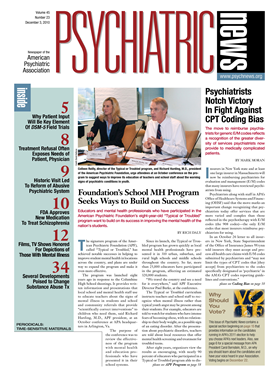There is no scientific basis for distinguishing between same-sex couples and heterosexual couples with respect to the legal rights, obligations, benefits, and burdens conferred by civil marriage, according to a brief signed by APA in support of plaintiffs seeking to overturn California's Proposition 8, which banned same-sex marriage.
The amicus curiae, or “friend of the court,” brief was filed by attorneys for the American Psychological Association, with the support of APA, the California Psychological Association, and the American Association for Marriage and Family Therapy.
The case at issue is Perry v. Schwarzenegger, a federal lawsuit filed in the United States District Court for the Northern District of California challenging the constitutionality of Proposition 8, a 2008 ballot initiative that amended the California constitution to mandate that “only marriage between a man and a woman is valid or recognized in California.”
This past August, Chief Judge Vaughn Walker ruled that Proposition 8 violated the due-process and equal-protection clauses of the 14th Amendment to the United States Constitution.
The case, awaiting appeal, has garnered nationwide attention, and a wide variety of organizations have filed briefs in support of or against the plaintiffs.
The brief signed by APA asserts that marriage confers emotional, psychological, and material benefits that are denied under Proposition 8 to same-sex couples.
“[E]mpirical research demonstrates that marriage has distinct benefits that extend beyond the material necessities of life,” according to the brief. “As a legal institution, marriage also gives legally wed spouses access to a host of economic and social benefits and obligations. Research [has established] that both tangible and intangible elements of the marital relationship have important implications for the psychological and physical health of married individuals and for the relationship itself. Because they are denied the opportunity to marry, California partners in same-sex couples are denied these benefits.”
The brief also argues that homosexuality is a normal expression of human sexuality, that gay men and lesbians form stable relationships equivalent in essential aspects to heterosexual relationships, and that many same-sex couples are currently raising children who will benefit if their parents are allowed to marry.
“Allowing same-sex couples to legally marry will not have any detrimental effect on children raised in heterosexual households, but it will benefit children being raised by same-sex couples,” the brief states. “First, those children will benefit from having a clearly defined legal relationship with both of their de facto parents, particularly for those families that lack the means or wherewithal to complete a second-parent adoption. Such legal clarity is especially important during times of crisis, ranging from school and medical emergencies involving the child to the incapacity or death of a parent.
“Second, children will benefit from the greater stability and security that is likely to characterize their parents' relationship when it is legally recognized through marriage. Children benefit when their parents are financially secure, physically and psychologically healthy, and not subjected to high levels of stress. They also benefit when their parents' relationship is stable and likely to endure. Thus, the children of same-sex couples can be expected to benefit when their parents have the legal right to marry.”
